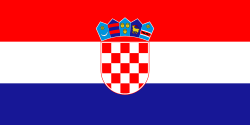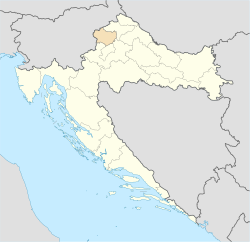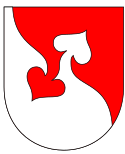Kumrovec
| Kumrovec | ||
| ||
| Basisdaten | ||
|---|---|---|
| Staat: | ||
| Koordinaten: | 46° 5′ N, 15° 41′ O | |
| Gespanschaft: | ||
| Fläche: | 16 km² | |
| Einwohner: | 1.588 (2011) | |
| Bevölkerungsdichte: | 99 Einwohner je km² | |
| Telefonvorwahl: | (+385) 049 | |
| Postleitzahl: | 49 295 | |
| Kfz-Kennzeichen: | KR | |
| Struktur und Verwaltung (Stand: 2013, vgl.) | ||
| Gemeindeart: | Gemeinde | |
| Bürgermeister: | Dragutin Ulama (SDP) | |
| Website: | ||
Kumrovec ist ein Dorf und die zugehörige Gemeinde (Općina) in der Gespanschaft Krapina-Zagorje im Norden Kroatiens. Im Jahre 2011 hatte die Gemeinde 1.588 Einwohner. Kumrovec ist bekannt als Geburtsort von Josip Broz Tito (1892–1980), dem langjährigen diktatorischen Staatschef Jugoslawiens.
Geografie
Kumrovec liegt unmittelbar an der Grenze zu Slowenien und ist etwa 60 Kilometer von der kroatischen Hauptstadt Zagreb entfernt.
Sehenswürdigkeiten

In Kumrovec gibt es zwei Sehenswürdigkeiten: das Geburtshaus Titos mit der bronzenen Tito-Statue, die von Antun Augustinčić geschaffen wurde sowie das Freilichtmuseum Etno-selo Kumrovec.
Am Rand des Ortes steht ein Obelisk zum Gedenken an Antun Mihanović, der 1835 die Nationalhymne Kroatiens Lijepa naša domovino schrieb.

Weblinks
Auf dieser Seite verwendete Medien
Das Bild dieser Flagge lässt sich leicht mit einem Rahmen versehen
Autor/Urheber:
- derivative work: Minestrone (talk)
- Croatia_location_map.svg: NordNordWest
Positionskarte von Kroatien
Autor/Urheber: Dennis Jarvis from Halifax, Canada, Lizenz: CC BY-SA 2.0
Kumrovec's claim to fame is that it is the birthplace of marshal Josip Broz Tito (1892–1980), the president of former Yugoslavia. The birth house of Tito (built in 1860 as the first brickwork house in the village) features the Memorial Museum of Marshal Tito, opened in 1953.
Next to the house is the bronze standing statue of Marshal Tito.
Kumrovec is a village in the northern part Croatia. The Kumrovec village has only 269 people.
The old part of Kumrovec comprises the Ethnological Museum with 18 village houses, displaying permanent exhibitions of artifacts related to the life and work of Zagorje peasants in the 19th/20th century. The village is small but was of great popularity in the former Yugoslavia.
The reconstruction and decoration of these houses started in 1977. So far 40 houses and other farm-stead facilities have been restored, which makes Staro Selo the most attractive place of this kind in Croatia. Visitors may see permanent ethnological exhibitions such as the Zagorje-style Wedding, the Life of Newly-weds, From Hemp to Linen, Blacksmith's Crafts, Cart-wright's Craft, Pottery, From Grain to Bread, etc.Autor/Urheber: Modzzak, Lizenz: CC BY-SA 4.0
Monument in a tribute of Croatian national anthem








